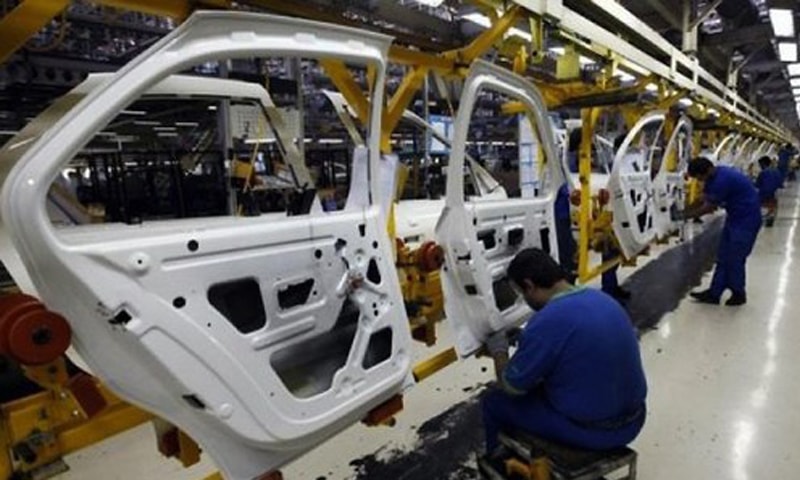KARACHI: Auto assemblers see the new fiscal year as promising owing to improved economic conditions which are translating into an increase in demand for vehicles.
Chief Operating Officer (COO), Indus Motor Company (IMC), Ali Asghar Jamali said political stability and improved law and order situation would help the industry to grow at an increased pace.
“I see a bright future for the auto industry and its growth potential is attracting a lot of players in this region,” he said.
He added that big auto players were eying the local market with interest and newly announced incentives by the government could motivate them further.
He said the reduction in interest rates is having a noticeable impact on car financing and in turn a positive effect on car sales.
The share of auto financing in car sales has increased from 20-22 per cent last year to up to 30pc this year.
Mr Jamali said this indicates that lower interest rates are increasing the customer’s buying power, resulting in an increased demand of automobiles.
Car sales hit to 180,079 units in 2015-2016 as compared to 151,134 units in 2014-2015, followed by a jump in truck sales to 5,550 units from 4,111 and bus sales to 1,017 from 569 units. The impressive figures of 2015-2016 were backed by 50,000 units of Suzuki Bolan and Ravi sold under Punjab Taxi Scheme.
CEO Top Line Securities Mohammad Sohail believes car sales will grow at 5-year (2016-20) compound annual growth rate (CAGR) of 12pc due to improving law and order situation in the country, rising auto financing owing to 42-year low interest rates and increasing disposable income.
Due to favourable sector dynamics, Pakistan which has 13 cars per thousand people, will reach 20 cars per thousand by 2020.
Senior General Manager Strategic Business Planning and Quality Assurance Division, Hinopak Motors Limited, Naushad Riaz said heavy commercial sector observed an extra ordinary growth during 2015-16 breaking all previous records.
The industry witnessed a similar boom in sales during 1992-93 when the Prime Minister Yellow Cab Scheme was launched.
At that time, there was an artificial increase in demand mainly due to major finance shared by financial institutions. This time, the scenario is totally different.
He said usually heavy commercial sector growth is linked with the economical condition of the country. Stable economic conditions ultimately gave positive signal to large scale manufacturing.
During the last few years, large scale manufacturing (LSM) recorded an upward trend and so by the HCV sector.
He said in the past three years, the demand in this sector was continuously increasing while 2015-2016 saw 45pc jump owing to economical stability, growth in LSM and government policies towards import of used vehicles.
Due to government’s policies, import of used commercial vehicles started declining and local assemblers fulfilled market demand thus improving assemblers’ confidence to enhance their production capacities followed by rise in government revenue, Mr Riaz said.
In the recently announced auto development policy (ADP), the decision to put age limit on import of commercial vehicles and changes in tariff would prove a morale boosting actions for the local assemblers, he added.
“The industry now looks confident to achieve 45pc sales growth in the current financial year as well,” he said.
He noted that the impact of the China-Pakistan Economic Corridor was yet to materialise.
Once this project start taking shape, HCV sector will grow beyond our expectation, he added.
“At present, the installed capacity of this sector is over 30,000 units per annum. With this installed capacity, they only need few weeks to hire and trained workers and get into business,” he explained.
At present, the market needs are catered by the best Japanese brands in addition to Korean and Chinese players but there is still room from Europe players, he said.
Senior Vice Chairman, Pakistan Association of Automotive Parts and Accessories Manufacturers (Paapam), Mashood Khan expects car sales to jump by 10pc in the current fiscal year if used car imports are limited. He said sales of commercial vehicles may grow by 15pc in 2016-2017.
He said Paapam on Friday held a soft launch at a local hotel for its upcoming 13th Pakistan Auto Show (PAPS), which will be held at Karachi Expo Center from March 3-5, 2017.
He said the economy is growing rapidly and PAPS would invite both local and international investors who are showing keen interest in working with Pakistan.
The main target of PAPS show is to benefit Pakistan through boosting its industries, promoting import substitution, enhancing exports and economic growth, he said.
Asfia Aziz of Shajar Capital foresees FY17 auto car sales to increase by 5-8pc with a shift in market share expected in 1,000CC as Honda Civic is forecasted to gain footing there by churning Toyota sales. Pak Suzuki is also expected to launch Celerio and possibly the 660cc Alto which would move the company’s volumes up.
Published in Dawn, July 17th, 2016













































